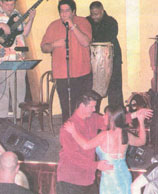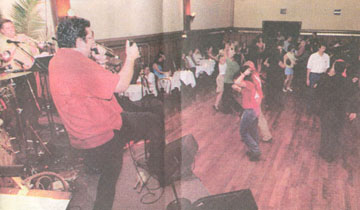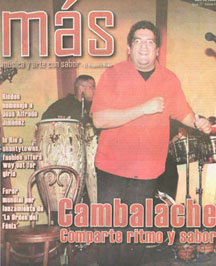|
Cambalache comparte ritmo y sabor
By VICTORIA HERNANDEZ While many still still discuss the issue of the
true origin of salsa music, others are conquering remote places in the
United States that the mix tropical beats and tunes has not yet reached. |
|
| forgetting its influences in New York and
Miami. It seems salsa may be on its way to conquering our entire
hemisphere, and moving beyond it as well. A decade ago, it was difficult to find a good quality salsa band in the Pacific Northwest. Not many people were familiar with the words salsa, rico, azucar and sabor. Now one hears these terms set to music and automatically starts dancing. |
 |
Going far beyond the fun terms used to describe this
type of music, the goal of many salsa bands is to accentuate genre's deeper
musical meaning. That belief is the significance of this music has led some
groups to become pioneers in distant places, reaching various communities in
this area of the country. For Cambalache, the recent growing popularity for salsa has only become a challenge to overcome. The band seeks to create the best salsa possible , knowing that they might be the first to disperse this music in some of the areas they reach. |
| Cambalache was born in 1999 in Seattle Wash. The band emerged from a
formation of a friendship between Pancho Chavez and Camilo Suarez. The two knew they wanted to start a band, but came across some problems when they tried to decided a name. Looking closely at the infamous keywords of the genre -- salsa, sabor, and azucar -- they infused these three together and created Cambalache. but there was more than to the name that merely the significance of those three words. "Cambalache means to share," says Chavez who leads the band and serves as a vocalist. According to Chavez "In Latin America we use the word Cambalache to describe the actions of partying.. In other words," he says "it describes some type of social disarray where the main goal is to have fun." But having fun is only a fraction of what Cambalache tries to inject into its audiences with each performance. Chavez considers Cambalache's main goal to be sharing our culture with other cultures in the United States." "We have committed ourselves to continuing and preserving the salsa tradition," he says. Since its debut, Cambalache has challenged and redefined the characteristic sounds of salsa in this part of the United States. |
| It is a blend of great classical salsa and contemporary
tunes that seduces their audiences. Chavez says the band is "never afraid to
incorporate new ideas, or to drop others that have been exploited. While the band obviously finds a lot of joy in their |
 |
"It has taken a lot of work and dedication," says Chavez, "but with a good musical concept and great business management, we have achieve something that no other orchestra has acquire in the Northwest."

